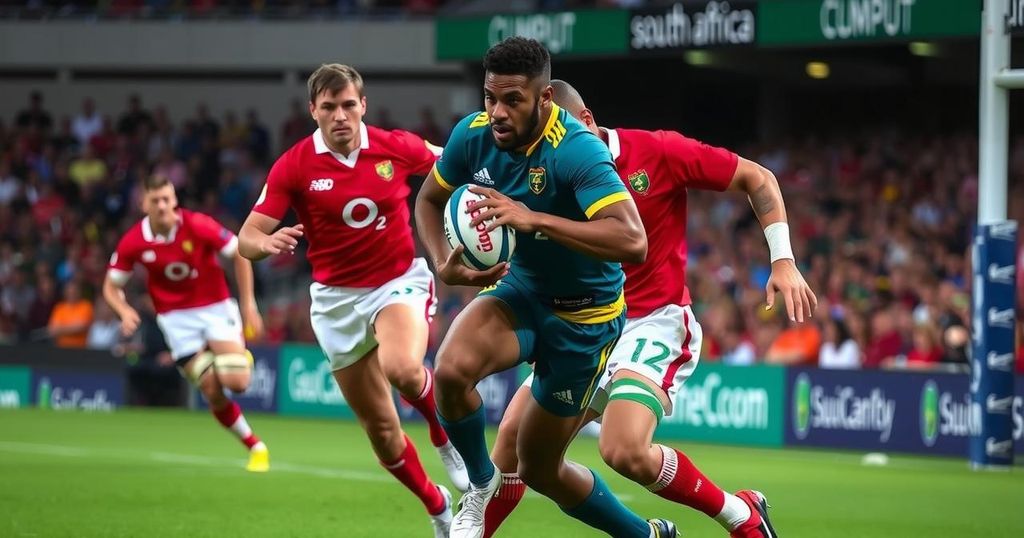Uncategorized
AFRICA, ANDRE ESTERHUIZEN, BOKS, BONGI MBONAMBI, BULLS, CHAMPIONSHIP, EQUATOR, EUROPE, INTERNATIONAL COMPETITION, INTERNATIONAL MATCH, LEICESTER, NORTH AMERICA, OX NCHE, OX NCHÉ, REPUBLIC, RUBEN VAN HEERDEN, RUGBY, SHARKS, SOUTH AFRICA, STOOP, STORM, STORMERS, TEST MATCH, UNITED STATES
Jamal Walker
0 Comments
South Africa’s Champions Cup Challenge: Navigating Current Hurdles
South African rugby teams, after strong World Cup performances, struggle in the Champions Cup, with only one win from six matches and concerns over travel logistics affecting player availability and performance. Coaches advocate for structural changes to support successful participation in European competitions, while acknowledging the importance of South African teams in the global rugby landscape.
The South African rugby scene, buoyed by back-to-back World Cup victories orchestrated by Rassie Erasmus, now faces significant challenges as its teams compete in the Champions Cup. Although initial transitions to the United Rugby Championship appeared seamless, recent performances have revealed sobering realities. In the first two rounds of the Champions Cup, South African teams managed only one victory out of six matches, raising concerns about their ability to compete at the European level.
These challenges are particularly evident in the wake of heavy defeats faced by the Sharks and Stormers against Leicester and the Harlequins, respectively. The travel demands associated with one-off matches in Europe have proven to be problematic, as both teams had to field weakened lineups due to player absences. The congested schedule compounded by significant injury lists has left both teams struggling to maintain competitive strength back-to-back.
Notwithstanding these setbacks, there is optimism among South African rugby officials. John Dobson, head coach of the Stormers, expressed a commitment to enhancing their performance within the Champions Cup framework. He stated, “As South Africans, we have to be better. We are not disrespecting the tournament, but we need to get ourselves into a better position.”
Furthermore, Welsh player Dan Biggar acknowledged the importance of South African teams, highlighting their status as double world champions and the substantial television revenue they bring to northern hemisphere competitions. Biggar’s perspective reinforces the notion that the presence of South African teams is beneficial, affirming their role in elevating rugby standards across Europe.
However, to alleviate the travel-related issues, it has been suggested to adapt the tournament format to allow for multi-match tours, akin to the structure seen in the URC. Such an approach would enable teams to acclimatize adequately, thereby improving performance quality. The broader discourse around South Africa’s role in European competitions also reveals a deeper, political divide.
As South African teams strive to uphold their integrity in European tournaments, the pressures mount. The recent losses underscore the need for immediate action to preserve their standing. If South Africa’s teams continue to falter, the risk persists that they could find themselves on the periphery of international rugby, with dire implications for the sport’s future within the region.
The article explores the current challenges facing South African teams in the Champions Cup, contrasting their recent successes and accomplishments in rugby with the harsh realities of competition in Europe. After being ingrained in a vibrant rugby culture, the teams are now grappling with logistical issues stemming from travel and scheduling conflicts, resulting in lackluster performances. It emphasizes the need for adaptations in tournament structures while also highlighting the dichotomy between the northern and southern hemispheres in the rugby landscape.
In conclusion, while South African teams have historically contributed to the richness of the rugby arena, recent performances in the Champions Cup have raised serious concerns about their capability to compete effectively. Structural modifications, particularly concerning travel logistics, are vital for these teams to realize their full potential. Moreover, the ongoing political tensions underline a necessity for South Africa to solidify its rugby presence internationally, lest it risks diminishing its esteemed standing in the sport.
Original Source: rugby365.com




Post Comment